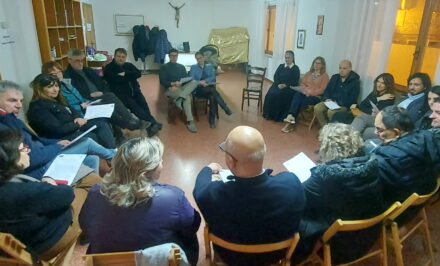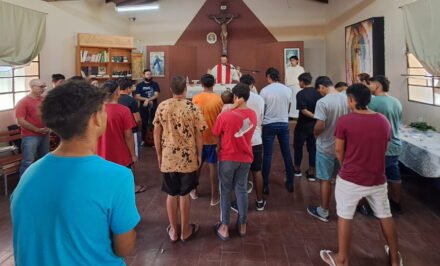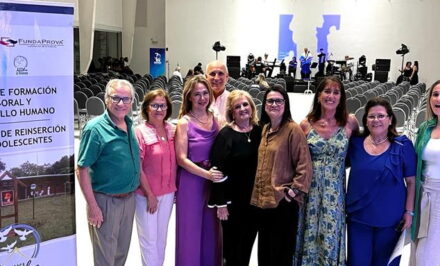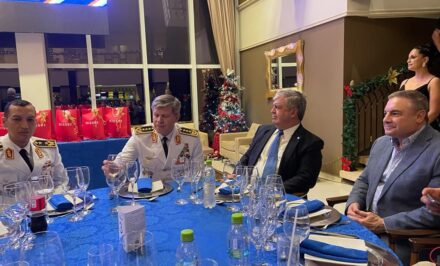
GERMANY, fma. The “I” in IKAF is growing. Amazement, followed by smiles and with some delay for translation, was the reaction of the participants at the meeting of the International Academy for Leaders at Schoenstatt auf’m Berg, Memholz. And indeed, through the presence of Fabrizio Usai from Rome, member of the founder generation of the Schoenstatt Family in Italy, programmer of schoenstatt.org, and by profession the leader of around a dozen colleagues, the meeting from 20-22 April had in fact become more international, and switched happily between German and English throughout. A number of new participants – partly through personal connections, and partly attracted by the Jour Fixe – and a subject that had developed from the last meeting, such as the project “Jour Fixe for business people and leaders”, introduced a real dynamism into the discussions on “A Person at the Centre”.
A person at the centre: a subject that had captured attention through studying covenant pedagogy from the viewpoint of the special force of personal attachment; a subject that also plays a central role in Fr Kentenich’s concept of communication, spiritual currents and society. After a brief keynote address on the subject, which was enriched by examples from Fr Kentenich’s life as the person at the centre (for example, of the founder generation, or the Fathers who worked in the Movement in the so-called “Arthur’s Circle”), the participants studied some of Fr Kentenich’s statements, and they inspired the rest of the meeting. This is the tried and tested method of the IKAF: Taking the actual experiences and questions of participants as the starting point and supplementing them with Kentenich texts so that the “hearts are set on fire”. This is Kentenich straight!
Core competencies

Taking a personal interest even in the insignificant details of a colleague’s life, empathy, human warmth, sympathy as inner feeling with a colleague, allowing loving intimacy instead of maintaining only a respectful distance: Key words that were repeatedly used following the study of Fr Kentenich’s statements.
“Ultimately that is covenant culture as a style of leadership”, a participant remarked. “As a leader I understand the way I deal with colleagues as something that is marked and formed by a covenant.”
Your experience becomes my experience
 The transition from sharing experiences, to understanding and interpreting them, was seamless. As the “experience cards” were attached to the pin chart a number of “question cards” were automatically answered. One participant related how a motto guides him as he leads his colleagues, “Your experience becomes my experience.” It means, “I am interested not just in your work, but in you, your life, the person you are.” In practice it means that the plan of work is coordinated with special challenges within a colleague’s family, such as a father’s serious operation or the difficult birth of a child. “This is how I ‘export’ Fr Kentenich to my company by telling them: You are important to me as a person.”
The transition from sharing experiences, to understanding and interpreting them, was seamless. As the “experience cards” were attached to the pin chart a number of “question cards” were automatically answered. One participant related how a motto guides him as he leads his colleagues, “Your experience becomes my experience.” It means, “I am interested not just in your work, but in you, your life, the person you are.” In practice it means that the plan of work is coordinated with special challenges within a colleague’s family, such as a father’s serious operation or the difficult birth of a child. “This is how I ‘export’ Fr Kentenich to my company by telling them: You are important to me as a person.”
Another participant kept a birthday list and took time for personal conversations, “Then we can trust one another through difficult stages in one’s life”.
This interested attachment to colleagues has a further, and easily measurable, consequence – a growing fullness of life, “I have to generate life, because life is only generated by life. So I may not just remain with passing on ideas or only redirecting a stream of ideas. However, as I do so I also touch life, and I assimilate this life into myself,” as Fr Kentenich said.
Infantile attitude, tensions, work or people?

Each time it is exciting when things become really practical. If I have to dismiss a colleague, how can I reconcile this with taking a personal interest? How am I to deal with an ‘infantile attitude’ (“I want it now, this way, so boohoo!”) and colleagues who constantly create enormous tension? “Sometimes it is easier to deal with them than with those who constantly swallow everything and paralyse the whole business with their moods…” And the subject that always interests everyone: How can we deal with tensions created by work that has to be done, and people who want to talk, and need our time and attention at that moment? If we always wait until all the work has been done and the right time for a conversation has arisen, the door will probably have been slammed shut long before. …
And late in the evening over wine and crisps and a great deal of time, plans and ideas come up … even to founding an Italian “section” of the IKAF.
A building site, shrine and Kentenich as the person at the centre

That weekend the IKAF meeting had a few special features: It took place while building work was in progress, because the construction of the cafeteria, with all its side effects, was in full swing; the place where the statue of Fr Kentenich will be put up on 20 May has already been cleared of rocks (“A free view to the shrine”); and dirty shoes were a trademark of the weekend. If you don’t get your hands (and shoes) dirty by courageously intervening in world events, you will never change them.
The meeting began in the shrine, and it is always ends with a very personal “harvest festival” in the “Founder Room” where Fr Kentenich’s statue is still being kept until the celebration on 20 May. There the participants ask for his blessing on all the practical steps they are planning to take. No other place would have done. In all probability a sort of extra IKAF meeting will take place on 20 May, because all intend to be there. Nothing else is possible, because it has to do with the person at the centre of the IKAF.
Translation: Mary Cole, Manchester, England













